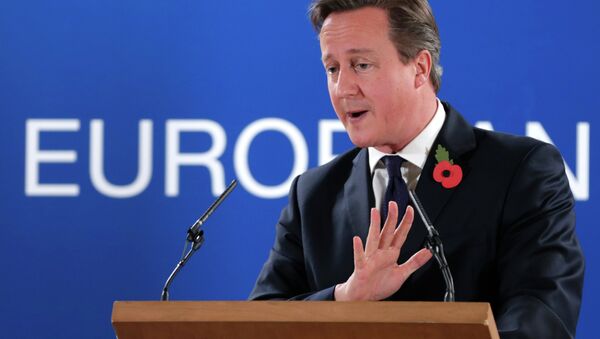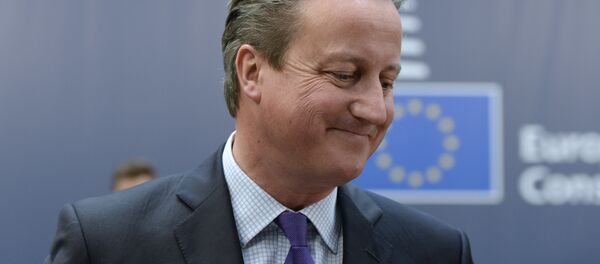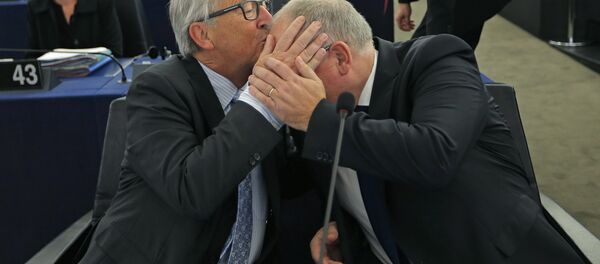David Cameron's recent visit to Iceland (that's the country not the frozen food chain) served a number of purposes. He used it to reject the so-called 'Norway option' — the idea put forward by some Euroskeptics that Britain would be better off with a 'semi-detached' relationship with the EU.
The meeting of the Northern Future Forum in Iceland was also an opportunity for Cameron to get support from leaders of other northern European countries on the UK's EU renegotiation. There was also talk of an ambitious new scheme to build an undersea cable 'interconnector' which would enable Iceland's volcanoes to power British homes.
Seeing the pictures of Cameron and Iceland's Prime Minister Sigmundur Gunnlaugsson together one can only reflect how different it all is to forty years ago, when the third 'Cod War' between UK and Iceland was about to begin. Those disputes over fishing limits seem rather quaint today — reminding one of that wonderful Peter Sellers/Jean Seberg film 'The Mouse That Roared' in the way that Iceland challenged Britain and its famous navy. At the time, however, the Cod Wars were no laughing matter — certainly not when the Icelandic gunboat Thor rammed HMS Andromeda in January 1976. Now the two countries are the best of friends and no one is mentioning 200 mile fishing limits.
But while Cod Wars were off the menu when Cameron met his Icelandic counterpart, it's hoped that other events in Iceland's recent history were discussed, as Britain could learn a great deal from its northerly neighbor.
Iceland is the only European country that has properly recovered from the financial crash in 2008. It did so by doing the very opposite of what other countries in Europe did. It rejected austerity and instead went for a more tightly regulated economy, with strict controls imposed on capital flows — controls which are still in place today. It did not bail out the banks and refused to protect bondholders. And most importantly, it jailed the bankers whose fraud, market manipulations and embezzlement caused the crash in the first place. Overall 26 bankers in Iceland have been sent to jail since 2008. What a contrast to Britain, where not one senior banker has gone on trial for what happened seven years ago.
Iceland's PM Sigmundur Davíð Gunnlaugsson on the EU #Brexit #EUreferendum #No2EU pic.twitter.com/EkObUWSZzy
— Alfred Albion (@AfredAlbion) August 6, 2015
Nobel prize winning economist Paul Krugman hailed Iceland's approach:
"A funny thing happened on the way to economic Armageddon: Iceland's very desperation made conventional behavior impossible, freeing the nation to break the rules. Where everyone else bailed out the bankers and made the public pay the price, Iceland let the banks go bust and actually expanded its social safety net."
The fact that Iceland was not in the EU was crucial as it allowed it to "do its own thing" in recovering from the crash. Sigmundur Gunnlaugsson told the BBC last week that for the "things that really matter" Iceland is in control of its own destiny.
"Having our own currency, which was absolutely essential, having control over our own laws to the extent that we could address the specific difficulties presented by the economic crisis, for example with the emergency acts and thirdly having control over our own natural resources."
Interestingly, the new global Prosperity Index for 2015, published today (2nd November) has Norway at number one, Switzerland (another EFTA member at 2), and Iceland at 12. The UK is only fifteenth. But of course, the 'Norway option' has to be dismissed, regardless of how well EFTA countries are doing. By any objective assessment, Iceland is reaping the benefits of its independence from Brussels and rejecting austerity.
A 2015 International Monetary Fund (IMF) report shows us just how well the country is doing:
"Iceland's robust economic growth will push economic activity past its pre-crisis peak this year. The economy grew by 2¼ percent on average in the past 3 years — a turnaround from negative growth in 2009-10-exceeding growth among the euro area crisis economies and the OECD average."
Real wages increased by 5.8% in 2014. Unemployment which was 8.3% in 2010 had dropped to 4.3% in September 2015.
"Iceland has made significant progress in strengthening the economy. Macroeconomic indicators reflect stability and the economy is rebalancing. Growth exceeds European averages, inflation is below the target, and the current account has shifted to a surplus."
While Icelanders enjoy the good times once again, the pro 'free-market' Wall Street Journal is not so happy, bemoaning the fact that Iceland's economy is run for the benefit of its people and not foreign capital:
"Since Nordic country imposed restrictions following banking collapse in 2008, it remains pariah among international investors."
David Cameron's position is clear: he wants Britain to stay in the EU (ideally a 'reformed' EU even more committed to neoliberalism than before), to follow austerity and run an economy in which the needs of bankers and 'global investors' come first. He wants us to regard these positions as 'common sense' and the only way a modern European economy can function.
But Iceland shows us there is another, more successful way. Namely that maintaining a high level of economic sovereignty, jailing corrupt bankers and following policies which the Wall Street Journal finds objectionable, is the true road to prosperity.
Follow Neil Clark on Twitter @NeilClark66








